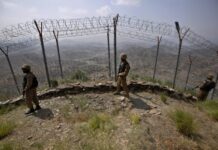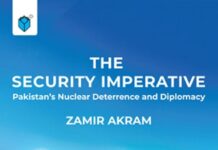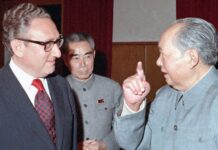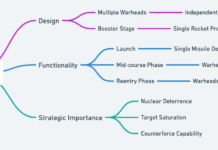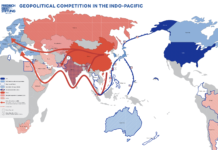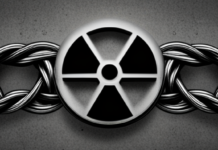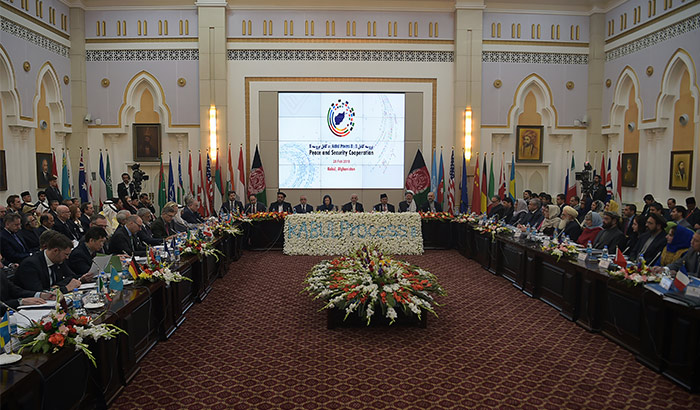Jaweria Waheed
Seventeen years of war in Afghanistan have resulted in a strategic stalemate plagued with a stalled peace process. Afghanistan is strategically important and is a fulcrum of power in the South Asian political landscape. Afghanistan has become a theatre of proxy war in which the United States, Russia, Pakistan, Iran and India are important players. The stalemate is because of a fixed power calculation which supports the zero sum game in Afghanistan in which little has been achieved in attaining long term peace. This impasse represents the prisoner’s dilemma where rational actors (in this case, Afghan government, Taliban, United States, Pakistan, Russia, Iran and India) fail to cooperate with each other to achieve sustainable peace even if each of them would benefit from doing so.
Afghan government is its own worst enemy; rampant corruption, lawlessness and weak state institutions have virtually crippled the country. Local Afghans have found an alternative in shape of the Taliban because of this dysfunctional government. Peace in Afghanistan would help the Afghan government to make better use of billions of dollars it receives from the international community. Instead, the government’s predatory corruption; political divisions, socio-economic challenges and nepotism have only contributed in strengthening the Taliban-led insurgency.
The Islamic State and the Taliban exhibit differing models of jihad. Their agenda, strategy, tactics and tools are different. Islamic State falsely claims to represent Muslim Ummah in its global multi-fronted war against the ‘Shia-Zionist-Crusader alliance’. The Taliban, however, focuses on Afghanistan, seeking to establish an Islamic Emirate within its borders and does not plan to take over the world. The Islamic State’s Khorasan chapter has appeared as a great challenge to the Taliban in Afghanistan. In addition to its animosity with the Afghan government, Islamic State’s expansion in Afghanistan has shaped Taliban’s policies and modes of operation. The Taliban’s willingness to pursue and welcome peace efforts in Afghanistan could help them in getting legitimacy at the national, regional and international levels.
For the United States, the dilemma becomes more pronounced because the costs of staying and leaving Afghanistan are both high. Afghan forces have been assisted and trained by U.S. advisors but it is disturbing yet instructive to know that the Afghan government is still unable to govern more than 40% of Afghanistan which is under the Taliban control and influence. U.S. economy shares a heavy burden of this war as Washington spends almost $45 billion annually in Afghanistan. Simply pulling out its forces would leave a power vacuum not only for the Taliban and the Haqqani Network but for transnational terrorist groups like Islamic State and Al-Qaeda. Abandoning Afghanistan with an abrupt troop pull out is, therefore, not an option for the United States since it will not only lose the good will of the people in Afghanistan, but also perpetuate instability in the region. US forces, the Afghan National Army and the feeble National Unity Government(NUG) have failed to rein in the Taliban and the Islamic State, something thathas worsened the country’s security profile
Russia and Iran have also helped the insurgency in order to offset any U.S. successes in Afghanistan. Tehran and Moscow have been publicly accused by the US of providing funds and ammunition in a bid to counter the Islamic State’s rise in its neighborhood. India uses Afghanistan for its proxy war against Pakistan. Major players in the conflict have been promoting their own foreign policy agendas by exploiting the Taliban as the face of the insurgency. It appears that Afghanistan will not only become yet another theatre in the multi-fronted rivalry between Washington and Moscow but may also witness the US and Iran battle each other.
Given that the Afghan quagmire is deepening because of multifarious factors, fixation with a one-dimensional and military-heavy approach is a recipe for disaster. The role of major stakeholders spoils the process of consensus building between the opposing sides. The US Secretary of State, Mike Pompeo, recently announced the appointment of Ambassador Zalmay Khalilzad as special advisor on Afghanistan with a stated agenda to overcome the stalemate between relevant stakeholders by developing opportunities to bring the Taliban and Afghan government on the table. The need of the hour is deft diplomacy through incremental and sustained CBMs, reducing the mistrust among stakeholders by aligning their divergent interests to achieve reconciliation through mutual consensus. However, in order to give negotiations a chance two things are needed. Violence must be stopped by all the concerned parties and regional and international actors must converge on the single agenda of brokering peace in the war-torn country. Disrupting peace processes because of geopolitical rivalries ,will close whatever little spaces are created for ending a seemingly endless war.
Jaweria Waheed is an M.Phil Scholar of International Relations at the University of the Punjab.



